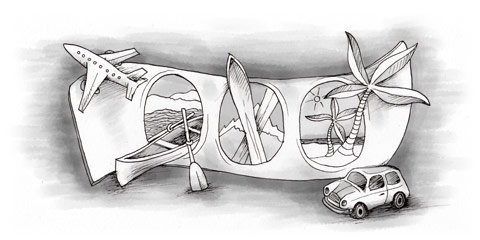Major auditoriums include the Royal National Theatre (South Bank), the Barbican Centre, the Royal Opera House (Covent Garden), and the Royal Court Theatre embraces modern drama; classical plays; comedy; musicals; revue and variety; children’s shows and pantomime; opera and operetta; ballet and dance. London’s fringe theatre is lively and extensive, and provides an excellent training ground for new companies and playwrights. Many venues nationwide support youth theatres, and people of all ages who see themselves as budding Laurence Oliviers or Katherine Hepburns can audition for local amateur dramatics societies. The theatre is well patronised throughout the country and is one of the delights of living in the UK, particularly if your home is within easy reach of London.
Excellent theatre and musical entertainment isn’t confined to London. Many provincial towns also have acclaimed theatres, concert halls and arts centres attracting international stars (and they charge only a fraction of London’s West End prices). The arts are subsidised by the Arts Council which, among other things, funds a repertory company touring programme that ensures the arts reach areas without permanent theatres.
Ticket costs
The cost of tickets for most London musicals and plays ranges from around £14 to £45 and from £10 to £35 for provincial theatres.
Opera, along with ballet, is largely patronised by only a small minority of the middle and upper classes. Ticket prices for performances at the Royal Opera House in Covent Garden partly explain why: a seat in the orchestra stalls costs around £150, while a seat offering a reasonable view costs in excess of £60. A limited number of bargain ‘slip’ seats with a very restricted view can be bought for as little as £11, but this probably has as more to do with the public relations of an institution which has been subsidised by the National Lottery to the tune of £70 million, than anything else. Prices vary with the production and the section of the theatre concerned and tickets at the top end of the price spectrum are markedly cheaper for ballet rather than opera performances.
Provincial ballet and opera tickets also cost far less, e.g. those for the English National Ballet on tour are between £10 and £55, while seeing the Glyndebourne Touring Opera costs between £21 and £49. Scotland and Wales have their own national opera companies, admission to whose performances is reasonably priced.
Dance performances in general tend to be relatively less expensive than opera. In addition to classical ballet, dance companies are popular and numerous throughout the UK, specialising in everything from contemporary dance to traditional forms from all corners of the globe.
Tickets for ballet, opera and musicals are in heavy demand, so you should apply well in advance. Some London musicals are solidly booked for months in advance, with many tickets being purchased by overseas tour operators selling theatre package tours. British ticket agencies also have representatives in many countries, allowing purchases to be made abroad. Most theatres accept credit card telephone bookings. Non-credit card telephone bookings are usually honoured for a number of days (e.g. three) unless booked on the day of the performance, when they’re kept until around an hour before the performance is due to begin. Postal bookings with payment by cheque or credit card can also be made (but give alternative dates if possible). (Many theatres also ask for a first class stamped addressed envelope). You can, of course, buy tickets personally beforehand at theatre box offices. Most London box offices are open from around 10am on performance days; however, in the case of West End shows, it’s advisable, even then, to telephone in advance and make a reservation before collecting your ticket, just to enhance your chances of success.
Discounts are usually available for groups (size varies) and school parties. Concessions (reduced price tickets) are often available for families, senior citizens (60+), young people (age varies from under 18 to 14-30 year-olds), students and the unemployed (students must show student identification and the unemployed a UB40 form.). Concession tickets may be ‘standby’ only, which means they’ve been left over and are sold cheaply a few hours before a performance. Among venues which do this is the Royal National Theatre. You can buy a subscription to a season of performances at many theatres and obtain a large discount, e.g. 30 to 40 per cent.
It’s advisable to purchase tickets directly from the venue, because ticket agencies charge a booking fee ranging from 15 to 25 per cent of the face value (similar to ticket touts, in fact). Before buying tickets from any secondary source, you should check the official box office price first (printed on the ticket) so that you know exactly how much commission you’re being asked to pay. Most ticket agencies don’t actually have any tickets, but simply ring the box office, which you might just as well do yourself. If you desperately want to see a show and cannot wait, you may be able to buy tickets from ticket ‘touts’, although you may be asked for two or three times a ticket’s face value.
Ticket Booths in London
The exception to the foregoing advice is the Society of London Theatre’s Ticket Booth in London’s Leicester Square, which sells tickets for West End shows at half-price on the day of performance. There’s an additional administrative charge of £2.50. Cash, credit and debit cards are accepted, but not cheques or travellers cheques. Seats are sold ‘from the top of the pile’ with no choice about where you sit, but they’re generally in the orchestra stalls and provide a good or excellent view. The booth is open from 10am to 7pm, Monday to Saturday, and noon to 3.00pm on Sunday.
Always check performance times with the box office or in a newspaper or entertainment magazine. If you’re late for a live performance, you may have to wait until the interval before being permitted to take your seat, although it may be possible to watch the show on a TV monitor. There are usually evening performances from Mondays to Saturdays and often a matinee performance on one weekday, usually a Wednesday or Thursday, and Saturday. There are no performances on Sundays (even actors and actresses are entitled to a day off!).
Most theatres have a number of spaces for wheelchairs, induction loops for the hard of hearing, and toilets for wheelchair users (but mention any special needs when booking). Some theatres produce braille programmes and brochures and most allow entrance to guide dogs for the blind. Some theatres have signed performances for the deaf and hard of hearing, but usually only on certain dates, so check first. Restaurants and/or bars are a feature of almost all of them, and some London and most provincial theatres have private or public car parks nearby. If you wish to have a drink or a cup of coffee during the interval, it’s best to order it in advance before the show starts and avoid the crush. Many of the points mentioned above concerning theatre facilities and tickets, also apply to concert halls and tickets (see below).
Free Programmes
Free programmes covering London or provincial theatres are available from Tourist Information Centres, and two very comprehensive sites providing the same information and more on the internet (www.officiallondontheatre.co.uk and www.londontheatre.co.uk ). On the former, you can sign up for a weekly email bulletin to keep right up to date with what is happening. Most British newspapers contain reviews of London and provincial shows, particularly broadsheet daily and Sunday newspapers which have their own theatre critics. London’s entertainment magazines What’s On (mainstream, conservative) and Time Out (progressive, more for the younger reader) carry comprehensive reviews and details of all London’s shows, as does the Evening Standard’s weekly ES magazine. Websites of interest include www.shakespeares.globe.org and www.nationaltheatre.org.uk .
Keen theatregoers living in Hertfordshire and Buckinghamshire can join Encore for Theatregoers, Pound Orchard, Peggs Lane, Aylesbury, Buckinghamshire, HP22 5HX (01296-630 112), which organises trips to regional and West End theatres and concert venues.
This article is an extract from Living and working in Britain. Click here to get a copy now.


